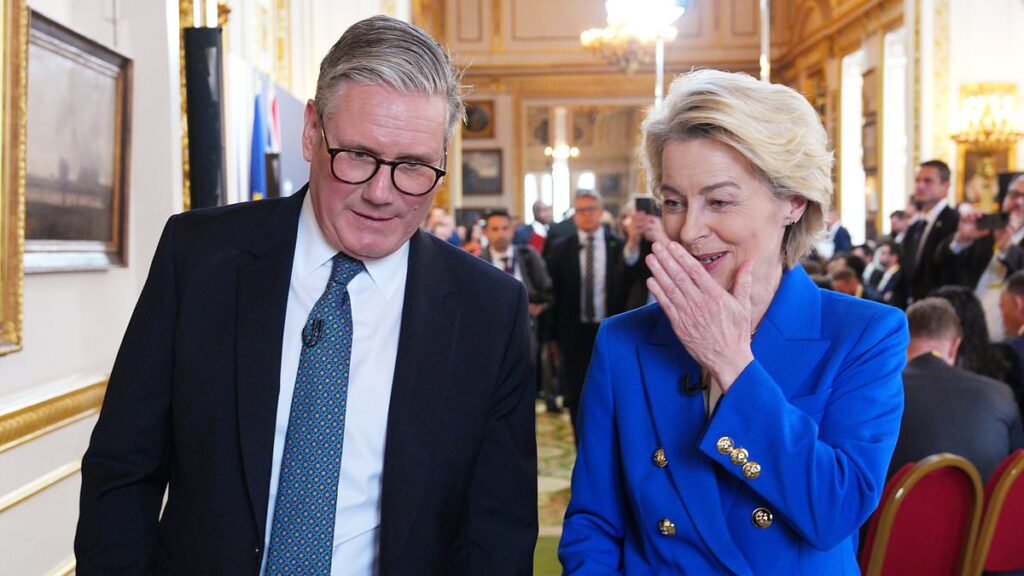Keir Starmer was accused of a great Brexit betrayal last night after agreeing a deal that hands Brussels control of British laws, money and fish.
The Prime Minister faced a furious backlash over a ‘surrender pact’ that will make Britain a ‘rule-taker’, forced to follow EU diktats with no say over them.
Sir Keir agreed to restart payments to the EU budget which could run into hundreds of millions of pounds a year. And, to the fury of Britain’s beleaguered fishermen, he caved in to French demands to allow access for EU trawlers until at least 2038 – more than 20 years after the public voted to take back control.
The agreement also paves the way for a ‘youth mobility deal’ which could eventually grant 80 million young Europeans the right to live and work temporarily in the UK.
Kemi Badenoch and Nigel Farage both pledged to scrap the deal if they win power at the next election.
But in a mechanism branded the ‘Reform clause’, the new deal with the EU would allow Brussels to impose swingeing tariffs on British exports if the fishing agreement is torn up early by a new government.
Mrs Badenoch branded the agreement a ‘total sell-out’, adding: ‘We will reverse this terrible deal at the first opportunity.’
She accused ministers of ‘backsliding on free movement’, adding: ‘Today, we found out that after months of secret negotiations away from Parliament, the media and the public, the Labour Government – Keir Starmer’s Government – has surrendered many of the gains we secured, on sovereignty, on money and control over our laws, to the European Union.’
UK Prime Minister Keir Starmer and President of the European Commission, Ursula von der Leyen, attend a press conference at the UK-EU summit at Lancaster House on May 19, 2025 in London
Kemi Badenoch (pictured) and Nigel Farage both pledged to scrap the deal if they win power at the next election
Boris Johnson said Sir Keir had ‘made this country a rule-taker’ and surrendered the sovereignty regained after Brexit
Boris Johnson said Sir Keir had ‘made this country a rule-taker’, surrendering the sovereignty regained after Brexit.
Calling it an ‘appalling sell-out’, the former PM said his successor had ‘agreed that Britain will once again be paying countless millions of pounds into EU coffers – for the privilege of becoming the non-voting punk of the EU Commission’.
Speaking at a choreographed event alongside EU Commission chief Ursula von der Leyen in London, Sir Keir insisted the ‘common-sense’ deal would be good for Britain. The PM, who fought tooth and nail to frustrate Brexit, said it was time to ‘move on from the stale old debates and political fights’ about the past.
Sir Keir said the deal would give the UK ‘unprecedented access to the EU market – the best of any country’ outside the bloc. The PM claimed it would result in ‘lower food prices at the checkout’ by making trade with the EU cheaper and easier.
And he said an agreement on the use of passport e-gates could ease queues for British travellers, although it was not clear when that might start.
Ms von der Leyen said the deal provided a ‘road map’ for even closer relations between Britain and the EU in future.
‘We are turning a page,’ she said. ‘We are opening a new chapter in our unique relationship.’
Labour’s love-in with the EU came as: Fishing leaders branded the agreement a ‘horror show’ that will end the dream of Britain taking back control of its rich fishing grounds; Downing Street claimed the deal, which will cut swathes of red tape on trade in food and farming, would be worth £9 billion by 2040; Experts warned that passport queues are unlikely to be cut this summer as further talks are needed with each of the EU’s 27 member states; A new deal on carbon emissions requires the UK to follow Net Zero rules ‘at least as ambitious’ as the EU; Ministers refused to say how many millions the UK would pay in to the EU budget, but admitted the deal would involve an ‘appropriate financial contribution’.
Britain’s Chancellor of the Exchequer Rachel Reeves (right) reacts after an introduction speech as Britain’s Prime Minister Keir Starmer walks towards the stage during a reception in Downing Street
Sir Keir denied he had been ‘stitched up like a kipper by the EU’. But Whitehall sources acknowledged that the PM had authorised a major concession on fishing to get the deal over the line on Sunday night following last-minute wrangling. Elspeth Macdonald, chief executive of the Scottish Fishermen’s Federation, described the deal as ‘a horror show for Scottish fishermen’. She said it underlined the ‘total indifference of the British political establishment to the interests of our fishing sector’.
And in a sign of government nerves, ministers last night signed off a £360 million package to soften the blow to coastal communities. Labour had claimed for months that it had ‘no plans’ to agree a youth mobility deal, which had been a key Brussels demand.
But talks will now begin on a ‘youth experience scheme’ that could allow tens or even hundreds of thousands of young Europeans to work and live in the UK temporarily. Sir Keir said the scheme would be ‘capped’, but accompanying documents state only that the ‘overall numbers’ should be ‘acceptable to both sides’.
Former Brexit negotiator Lord Frost said the new deal was ‘worse than I thought’.
‘This deal concedes important British interests for very little in return,’ he said. ‘It begins the process of bit by bit bringing this country back into the embrace of the single market and customs union.’
But the deal was welcomed by some business organisations whose members have been frustrated by post-Brexit checks.
Shevaun Haviland, of the British Chambers of Commerce, said a deal to cut unnecessary checks on food and drink exports would be ‘a huge boost’.
Supermarkets Asda and Morrisons both said it would be ‘good news for shoppers’.
